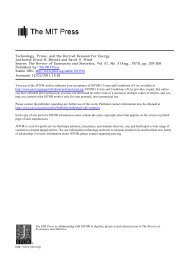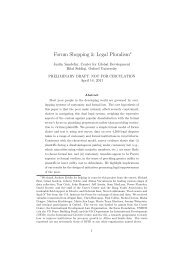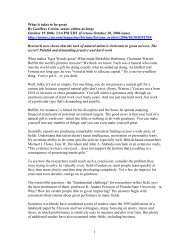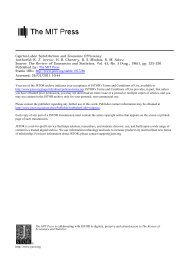Phan Coxhead Vietnam Wage Paper April 14 2011 - Agricultural ...
Phan Coxhead Vietnam Wage Paper April 14 2011 - Agricultural ...
Phan Coxhead Vietnam Wage Paper April 14 2011 - Agricultural ...
Create successful ePaper yourself
Turn your PDF publications into a flip-book with our unique Google optimized e-Paper software.
4<br />
the Gini coefficient of average hourly wages, has been uneven. The coefficient rose from 0.38 in 1993 to<br />
0.42 in 2002, but declined to 0.36 in 2004 and 0.35 in 2006, then finally increased again to 0.39.<br />
While there was wage growth for all groups, its pace has been unequal across groups, and the trend has<br />
not been linear. From 1993 through 2008, the change in log average real hourly wages was 0.66 for<br />
women and only 0.57 for men (see Table 2). As a result, there has been a decline in the gender wage<br />
gap. Most of this decline happened from 1993 through 2002. Since 2002, the gender wage gap has<br />
stayed relatively stable.<br />
The rural-‐urban wage gap rose significantly in the 1990s, peaked in 2002, dropped in 2004 and 2006, but<br />
climbed up again in 2008. This trend might be due to rising urban living costs and the speed with which<br />
nominal wages kept up with this rise. In the period 2006-‐2008, inflation rates were high in <strong>Vietnam</strong>,<br />
largely due to higher energy and food prices. 4 These, coupled with rising real estate prices must have<br />
pushed up urban living costs relative to rural living costs. Indeed, the urban price deflators for the years<br />
2006 and 2008 were 1.23 and 1.18, respectively. These are very high compared to years 2002 and 2004,<br />
when the urban price deflators were only about 1.07 and 1.06, respectively. Nominal wages might not<br />
have increased fast enough to keep up with the unexpected and sharp increase in urban living costs in<br />
2006, so real wage growth in 2006 for urban workers might have been lowered.<br />
In 1993, ratio of the average wage of the Kinh ethnic majority to the average wage of ethnic minorities<br />
was quite low at 1.08. But there was a sharp increase in this ratio from 1993-‐2002 (1.84 at its peak in<br />
2002). After that, it decreased to 1.34 in 2004 and became stable at this level until 2008.<br />
Another interesting revelation from Table 1 is the wage differential between public and private sectors.<br />
In 1993, public sector workers’ average wage was lower than that of private sector workers. But by<br />
2002, public sector workers’ average wage was 170% that of private sector workers, as wage grew much<br />
faster in the public sector (wage growth rates were 27.6% in 1993-‐1998 and 23.02% in 1998-‐2002 for<br />
public sector, while the rates were 15.91% and 6.15% for private sector; see Table 2). In the period<br />
2002-‐2008 however, wage growth rate in the private sector started to catch up with that of public<br />
sector. Consequently, public to private wage ratio declined from 1.7 in 2002 to 1.57 in 2004, then<br />
remained stable until 2008.<br />
Finally, wage growth has been higher for those with higher levels of education (see Table 2), leading to a<br />
rise in skill premia. As can be seen in Figure 1, in 1993 there was hardly any skill premium, measured by<br />
the ratio of the average wage of those with a particular educational degree to those without any degree.<br />
This must have been a result of central planning, in which wages were institutionally set rather than<br />
determined by market forces. From 1993 through 2002, as the economy went through a series of<br />
domestic reforms, there was a dramatic increase in skill premium, especially for college-‐educated<br />
workers. It’s quite interesting however that from 2002-‐2008, this rise in skill premium has leveled off.<br />
4 Large capital inflows also made a significant contribution to rising inflation.







